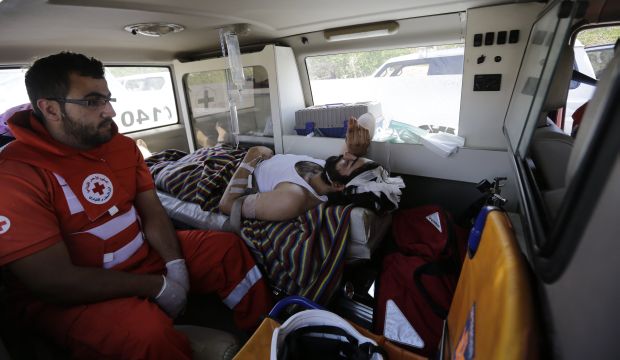
A wounded civilian is evacuated in a Lebanese Red Cross vehicle from the northeastern town of Arsal in the Lebanese Beqaa Valley on August 7, 2014. (AFP Photo/Joseph Eid
Beirut, Asharq Al-Awsat—Hopes of a resolution to the crisis in the Lebanese border town of Arsal were raised on Wednesday following a truce that allowed 70 percent of the fighters from the town to withdraw, sources told Asharq Al-Awsat.
Fighters from the Al-Nusra Front, a Syrian jihadist opposition group, seized parts of the town on Saturday, reportedly after one of its leaders was arrested by the Lebanese security forces.
The Lebanese army responded by sealing off the town, and launching a counteroffensive.
Speaking on condition of anonymity, sources with knowledge of the situation on the ground said: “The army left a gap open . . . east of Arsal towards the mountains leading to the Syrian border, after taking control of all the military posts [in the town].”
“The army is in total control of the hills overlooking the town from the western side, and on the Tall Al-Sarj hill which extends from Al-Masiadeh checkpoint northeast of Arsal to Wadi Al-Ra’ayan southwest of the town,” the sources added.
These developments followed successful efforts to mediate by the Muslim Scholars Association, who negotiated a truce between the two sides on Wednesday. News agencies reported on Thursday that the truce had allowed the bulk of the Al-Nusra Front fighters to withdraw from the area, though they had reportedly taken seven hostages with them.
The incident has raised fears across the region of further spillover from the conflict in Syria reaching Lebanon. In response, Saudi Arabia’s King Abdullah bin Abdualaziz offered 1 billion US dollars in aid to the Lebanese military.
Meanwhile, reports in Lebanon have shown increasing support for Lebanese army chief Jean Kahwaji for the vacant post of president, thanks to the higher public profile he has gained from dealing with the Arsal crisis.
The Lebanese presidency has been vacant since former President Michel Suleiman completed his term at the end of May. Under Lebanon’s political system, the post of president is reserved for a member of the Maronite Christian community.
However, Lebanon’s Christian parties are split between two opposing candidates belonging to different political blocs, which has led to months of political deadlock in which the Lebanese parliament has been unable to elect a new head of state.
Informed sources, speaking on condition of anonymity, told Asharq Al-Awsat on Wednesday that Kahwaji was increasingly seen as a prime candidate “while we wait for the outcome of the talks between the opposing teams, especially those led by leader of the Progressive Socialist Party [PSP], Walid Jumblatt.”
Following a meeting with Hezbollah leader Hassan Nasrallah two weeks ago, Jumblatt held meetings on Wednesday with the presidential candidate from the March 8 alliance and leader of the Change and Reform parliamentary bloc, Michel Aoun. He also held a meeting with former president Michel Suleiman, Maronite Patriarch Bechara Boutros Al-Rahi, Prime Minister Tammam Salam, and former prime minister Fouad Siniora.
The Lebanese National News Agency said the meetings discussed the issue of the presidency and the parliamentary elections, in addition to the security situation in Arsal, as well as the financial aid Lebanon received from Saudi Arabia to help deal with the crisis.
Meanwhile, Rami Al-Rayes, media officer of the PSP, told Asharq Al-Awsat: “Jumblatt sensed the danger of the events in Arsal and he warned about them already, so therefore it was natural to become more active on various issues to build an internal network of understanding to secure Lebanon.”
Asked if Jumblatt called on Aoun and his rival, the March 14 alliance candidate Samir Geagea, to withdraw in favor of Kahwaji, Rayes said: “Naturally the developments require all parties to make new political decisions which take into consideration that time no longer allows the luxury of pointless political negotiations and disagreements.”
In the meantime, Change and Reform MP Alain Aoun said that the Arsal crisis was not grounds for radical changes in the presidential contest.
He told Asharq Al-Awsat: “The meeting between the leaders of the Change and Reform bloc and the PSP broke the deadlock between the two sides and should facilitate the communication process,” adding: “the discussion included all issues and ways to deal with the developments and the election of a president.”
Asked if the recent events in Arsal would lead to a change in the position of Michel Aoun regarding his intention to run for the presidency, he said: “Despite the importance of the events in Arsal, I have not seen anything that necessitates a change to the political system in general and the presidential issue in particular.”
Should Jumblatt’s efforts succeed and a presidential candidate is agreed on in the next few days, the way will be cleared for fresh parliamentary elections in Lebanon without the need for another extension of the current parliament’s term.
The forthcoming elections, originally scheduled for June 2013, were pushed back 17 months—until November 2014—due to fears of instability arising from the conflict in neighboring Syria.
Additional reporting by Caroline Akoum in Beirut.
